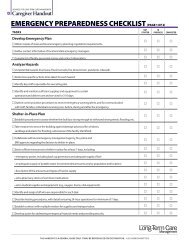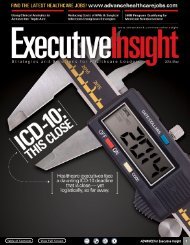ADVANCE for Executive Insight 1 ADVANCE for Executive Insight
ADVANCE for Executive Insight 1 ADVANCE for Executive Insight
ADVANCE for Executive Insight 1 ADVANCE for Executive Insight
- No tags were found...
Create successful ePaper yourself
Turn your PDF publications into a flip-book with our unique Google optimized e-Paper software.
Healthcare is evolving faster now than ever in response<br />
to a number of powerful <strong>for</strong>ces. These include HI-<br />
TECH, Meaningful Use, big data, decreasing costs<br />
and increasing availability of personalized medicine, and<br />
EMR adoption. However, most significant is the creation<br />
of Accountable Care Organizations (ACO) under the Af<strong>for</strong>dable<br />
Care Act, and the significant shift, practically and<br />
culturally, from volume to value.<br />
If the financial outcome under the fee <strong>for</strong> service model<br />
keeps patients in the hospital, then they will be kept out<br />
under the ACO model. While ACOs do not remove fees<br />
<strong>for</strong> services, they do create savings incentives to motivate<br />
volunteer organizations to meet specific quality benchmarks<br />
which demonstrate that they have saved healthcare<br />
dollars, and ultimately improved<br />
patient care.<br />
One problem, however, is that<br />
while volume is easy to measure<br />
(the more you do, the more you<br />
get paid), proving value with<br />
quality metrics is more difficult.<br />
And when trying to predict outcomes<br />
(e.g., keeping patients out<br />
of the hospital) the difficulty only increases.<br />
So how can the clinical laboratory contribute to this<br />
new challenging environment? The fact that it is the production<br />
engine and custodian of vast amounts of test<br />
result data that is relied upon <strong>for</strong> over 70% of diagnoses<br />
by some measures, is insufficient.<br />
The key to the laboratory fulfilling<br />
its potential, and enabling the ACO<br />
to fulfill its potential, lies in understanding<br />
how to interpret<br />
and apply its<br />
data in a strategically<br />
meaningful way.<br />
Three specific areas<br />
The laboratory cannot become a<br />
data enabler in a meaningful way<br />
<strong>for</strong> the ACO unless it becomes a<br />
data partner with all of the other relevant<br />
and willing moving parts.<br />
it can support to achieve this are test ordering guidance,<br />
admissions and discharges and pharmacy.<br />
Test Ordering Guidance<br />
The test ordering process is one initial area upon which<br />
the laboratory can have a significant impact. Under the<br />
ACO model, we must unite a disparate network of physicians<br />
on the one hand, and the need <strong>for</strong> first-time accuracy<br />
of testing and rapid turn-around time on the other. With<br />
rapidly expanding test menus, particularly in molecular<br />
diagnostics, it is unrealistic <strong>for</strong> physicians to know all of<br />
the recommended ordering practices. Inevitably, the ordering<br />
of old tests when new ones are available, the ordering<br />
of new tests to a “‘panel”’ without replacing one in<br />
that panel or the ordering of tests<br />
useful <strong>for</strong> research but not necessarily<br />
in diagnosis, are all risks<br />
to ACO success.<br />
Just as pharmacists influence<br />
physicians’ drug ordering, the lab<br />
can make a difference in test ordering<br />
to pre-empt such potential<br />
issues. One currently uncommon<br />
method is to create a lab test <strong>for</strong>mulary. When offered tests<br />
are presented to the physician as <strong>for</strong>mulary products, some<br />
may require pathology review, some infectious disease review,<br />
and even <strong>for</strong> some, chief medical officer review, be<strong>for</strong>e<br />
being approved. Such an approach also aligns well with<br />
broader industry ef<strong>for</strong>ts such as the<br />
American Board of Internal Medicine’s<br />
“Choose Wisely” campaign<br />
which that focuses on encouraging<br />
stakeholders to address<br />
tests and procedures<br />
that may be<br />
unnecessary. 1 Even<br />
without required<br />
By Jonathon Northover, JD, BVC (ICSL), and<br />
James Carson, PhD, MBA, MLS(ASCP)<br />
scott frymoyer<br />
<strong>ADVANCE</strong> <strong>for</strong> <strong>Executive</strong> <strong>Insight</strong><br />
13









